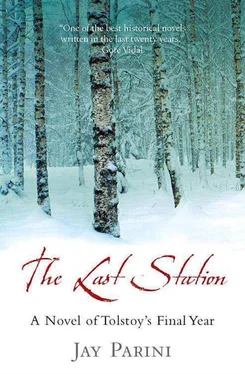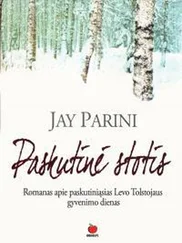Jay Parini
THE LAST STATION
A Novel of Tolstoy’s Final Year
For Devon,
every word, always
There was a muddy center before we breathed. There was a myth before the myth began, Venerable and articulate and complete.
From this the poem springs: that we live in a place That is not our own and, much more, not ourselves And hard it is in spite of blazoned days.
Wallace Stevens, ‘Notes Toward a Supreme Fiction’
The year has turned again, bringing us to the end of the first decade of the new century. I write the strange numbers in my diary. 1910. Is it possible?
Lyovochka is asleep now, and he will not waken till dawn. A while ago, I was drawn by his rattling snore down the hall to his bedroom. His snore sounds through the house like a creaking door, and the servants giggle about it. ‘The old man is sawing wood,’ they say, right in front of me. They no longer respect me, but I smile back at them.
Lyovochka’s snoring doesn’t bother me, since we sleep in separate rooms now. When we slept in the same bed, he had teeth: they lessened the snore.
I sat on his narrow little bed and pulled the gray blanket with the key design up to his chin. He started, forcing a monstrous grimace. But he didn’t waken. Almost nothing wakes Leo Tolstoy. Whatever he does, he does completely: sleep, work, dance, ride, eat. They write about him constantly in the press. Even in Paris, the morning papers adore tidbits of gossip about him, about us – true or untrue, they don’t care. ‘What does Count Tolstoy like for breakfast, Countess?’ they ask, lining up on the front porch for interviews throughout the summer months, when the weather in Tula makes this a pleasant destination. ‘Does he cut his own hair? What is he reading now? Have you bought him a present for his name day?’
I don’t mind the questions. I give them just enough to send them happily on their way. Lyovochka seems not to care. He doesn’t read the stories anyway, even when I leave them on the table beside his breakfast. ‘They are of no interest,’ he says. ‘I don’t know why anyone would care to print such rubbish.’
He does, however, glance at the photographs. There is always a photographer here, snapping away, begging for portraits. Chertkov is the most troublesome. He thinks himself an artist with the camera, but he is just as foolish with that as with everything.
Lyovochka slept on, snoring, as I smoothed his hair. The white hair that tumbles on his starchy pillow. The white beard like spindrift, a soft spray of hair, not coarse like my father’s. I spoke to him as he slept, called him ‘my little darling.’ He is like a child in his old age, all mine to coddle, to care for, to protect from the insane people who descend upon us daily, his so-called disciples – all led on, inspired, by Chertkov, who is positively satanic. They think he is Christ. Lyovochka thinks he is Christ.
I kissed him on the lips while he slept, inhaling his babylike breath, as sweet as milk. And I remembered a bright day many years ago, when I was twenty-two. Lyovochka’s beard was dark then. His hands were soft, even though he spent a fair amount of time with the muzhiks, working in the fields beside them, especially at harvest. He did this for recreation, really. For exercise. It was not so much a point of honor then, as it would be later, when he liked to imagine himself, at heart, one of the noble muzhiks he adores.
He was writing War and Peace , and every day he would bring me pages to recopy. I do not think I have ever been happier, letting my hand darken those pages, letting the black India ink summon a vision as pure and holy as any that has ever been seen or dreamt. Nor was Lyovochka ever happier. He has always been happiest within his work, dreaming his grand, sweet dreams.
Only I could read Lyovochka’s handwriting. His crablike hieroglyphs filled the margins of his proof sheets, driving the printers wild. Corrections blotted out corrections. Even he could not make out what he had written much of the time. But I could. I read his intentions, and the words came clear. In the afternoons, drinking linden tea, we would sit for hours by a peat fire, discussing changes. ‘Natasha would never say such a thing to Prince Andrey,’ I would tell him. Or ‘Pierre is too simple-minded here. He is not as stupid as he pretends.’ I would not let him write badly. Nor would I let him drowse in his study or spend too much time on horseback or in the fields. Lyovochka had more important work to do. I drove him to his desk. I was important to him.
But I do not matter now.
Not like in those early years, as on my name day, September 17, when I was twenty-two, as slender and beautiful as a daffodil.
We had three children then. Taking care of them, looking after the entire estate (Lyovochka has never been good with details or management – not then, not now), and copying his manuscripts, my days were exhaustingly full. But I did not complain, even when he spent endless hours chatting in his study with that silly bluestocking Marya Ivanovna, who had attached herself to him like a limpet.
I knew she would not last. Of all the women in his life, only I have lasted. They could not wear me down, and they will not.
That was in 1866. I remember because it was the year our blessed tsar, Alexander, was saved by the hand of God. A miracle. He had been taking his daily walk in the Winter Garden when a deranged youth (from a well-known family, alas) fired at him with a pistol. The quick hand of a muzhik saved the tsar, dashing the gun to one side.
That same night, in Moscow, Lyovochka and I attended the theater, as we often did in those days. The performance began with everyone in the audience standing to sing ‘God Preserve the Tsar!’ I have never seen such weeping! For weeks after, I gave thanks at special masses held in the Chapel of St Nicholas, near the Kremlin. Russians needed their tsar then. They need him now, though one would never know it listening to my husband and his friends. It is a wonder the police haven’t silenced them. If Lyovochka weren’t as powerful as the tsar himself, I dare say they would.
Of course, Lyovochka won’t hear me on this subject. He despises the tsar, on principle. But in our early days together he was a monarchist, too. He worshiped Alexander, who had freed his cousin, Major-General Prince Volknosky, who had been one of the Decembrists sent to Siberia by Nicholas I. His wife, the princess, had gone into exile with them, leaving behind a small child.
On that name day, long ago, the late-summer light fell slantwise through the yellow birches. I spent the morning by myself, wandering in Zasyeka Wood, smelling the rich earth, the late-blooming flowers. One maple, to my surprise and horror, was already scarlet, lit like a bell in a strange light. I stood beneath it, unable to control my tears.
Lyovochka appeared from behind the tree. In a white blouse, looking more like a muzhik than a nobleman, he dazzled me with his stare. Such intensity! Had he followed me here?
‘Why these tears, my little Sonya? What’s wrong?’
I bit my lip. ‘Nothing,’ I said.
‘Nothing?’ he said. ‘Something.’
‘This tree,’ I said. ‘Look! Already the leaves have turned. Soon the whole wood will be bare.’
I could hardly tolerate the winters in Tula, then or now. There is no escaping the cold, the blue wind and snow. The trees, with their black branches, crowd my mind. I find it impossible to think.
Читать дальше













